In 1870, Fisk University was going through some big changes. They were growing at such a rate they had to make plans to move locations(admittedly, a good problem to have). However, Fisk didn’t have the money for this ambitious plan. So, Professor and Treasurer George L. White came up with a gamble. Fisk would start a choir that would tour and raise funds for the school. White hadn’t been a singer himself, but had directed choirs in the past, and had already gathered $400 with a choir at Fisk for the benefit of their education. So, the Jubilee singers began, with a young Ella Sheppard serving as accompanist and director.
After their profound success in their famous 1871 tour, they set off again in the fall of 1872. They stopped by Steinway Hall in New York, the premier music hall in New York City at the time. This attracted much attention, and earned itself a review in “The Aldine, A Typographical Art Journal”. In its March edition, the author wrote in great detail of their experience hearing the Jubilee singers.
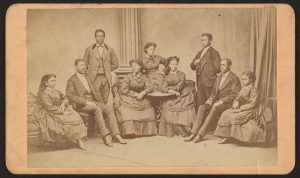
The 1871 Tour Fisk University Jubilee Singers From Left to Right: Minnie Tate, Greene Evans, Isaac Dickerson, Jennie Jackson, Maggie Porter, Ella Sheppard, Thomas Rutling, Benjamin Holmes, and Eliza Walker.
After giving a brief introduction to the Fisk Jubilee Singers, not unlike the one I’ve given you above, the critic started right into, to give them the benefit of the doubt, what surely they thought was a very earnest and not racist review of their performance. However, as I read through the publication, I was perplexed. The reviewer was giving the Jubilee singers these halfhearted, backhanded comments and compliments, saying things like “The personal history of these singers would be enough to make their concerts deeply interesting, even if their music was not very good. But, indeed, their music itself is admirable.” This is immediately followed by “They have, of course, no great cultivation”. There are various comments like this, a kind comment followed by a step back to recognize a flaw. This is, quite frankly, rude. Additionally, the critic refers to the singers as “impressionable minstrels”, their enthusiasm and expression as “grotesque, sometimes, but always genuine”, and the music itself as “clearly not the product of civilization” and lacking in “traces of the more scholarly music of the dominant race”.
The Fisk Jubilee singers redefined the spiritual for a wider audience, and used that audience to fund the education of hundreds of thousands of African Americans over the next 150+ years. The author of this article reflects how the Fisk jubilee singers were viewed by some at the time of their initial tours, not as artistic equals and scholars seeking to fund their program to further their educational endeavors, but as a lesser choir showing the songs of their people, trying to mimic the popular choral sound of the day. The review is by and for the people who were simply not ready for the Jubilee Singers.
Here is a 1909 Recording of the Fisk Jubilee Singers performing Swing Low Sweet Chariot.
Below is a 2020 recording of Fisk’s Jubilee Singers performing Walk Together, Children (Arr. Moses Hogan).
Black, James Wallace. Jubilee Singers, Fisk University, Nashville, Tenn. 1870-1880, Library of Congress, https://lccn.loc.gov/2010647805
“George Leonard White.” PBS, Public Broadcasting Service, www.pbs.org/wgbh/americanexperience/features/singers-white/. Accessed 1 Oct. 2024.
“MUSIC.: THE JUBILEE SINGERS.” The Aldine, A Typographic Art Journal (1871-1873), vol. 6, no. 3, 03, 1873, pp. 67. ProQuest, https://www.proquest.com/magazines/music/docview/124830318/se-2.

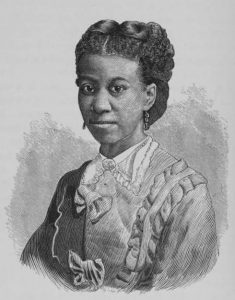
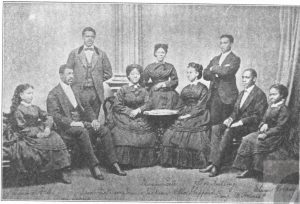
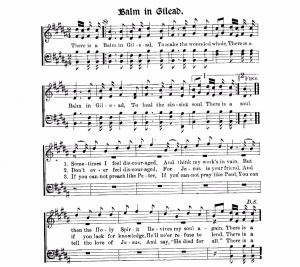
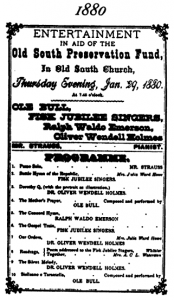
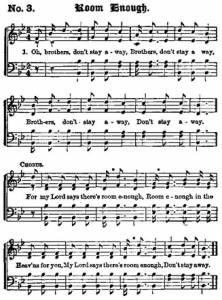 Oh, brothers, don’t stay away, . . .
Oh, brothers, don’t stay away, . . .
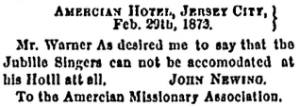
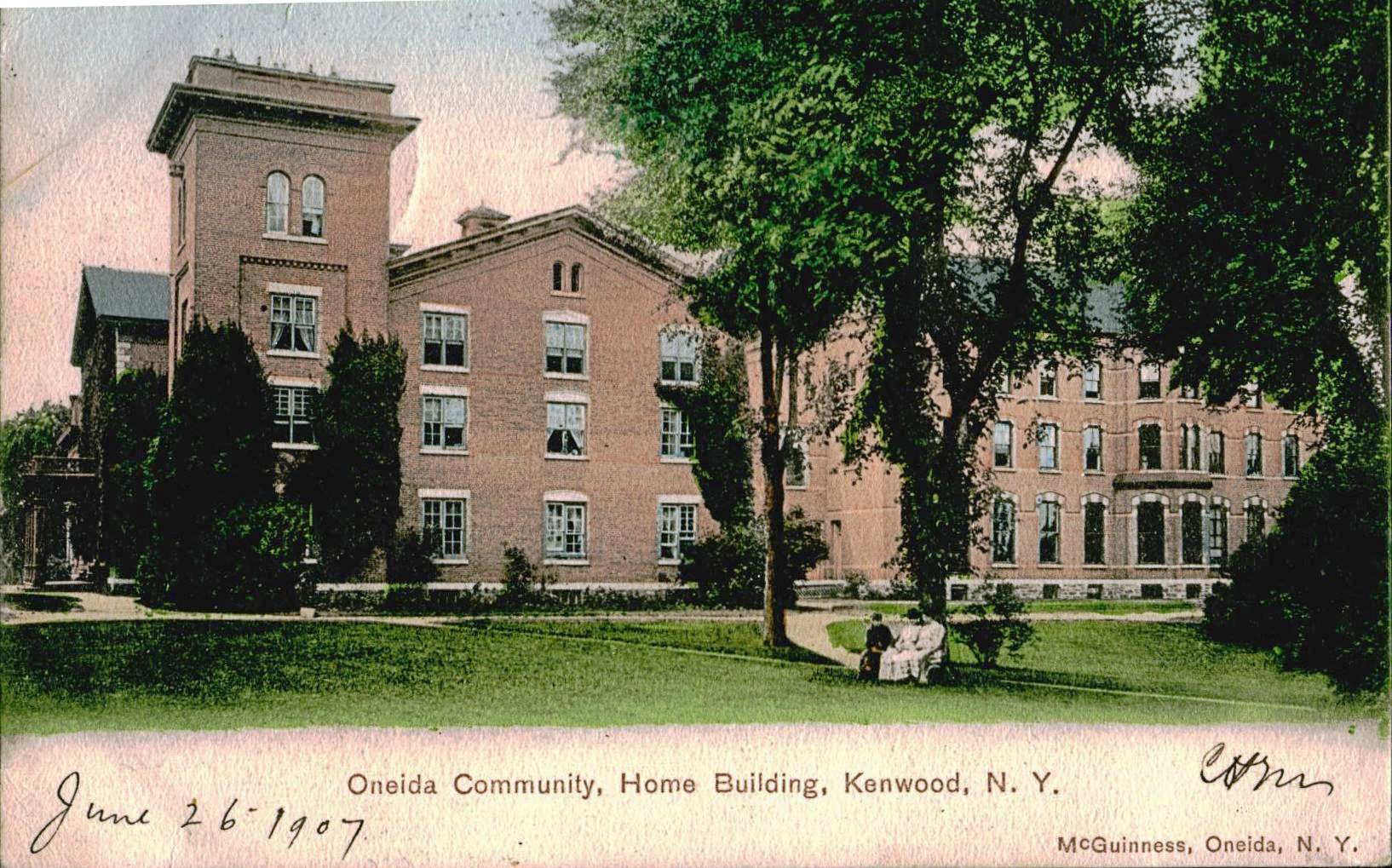
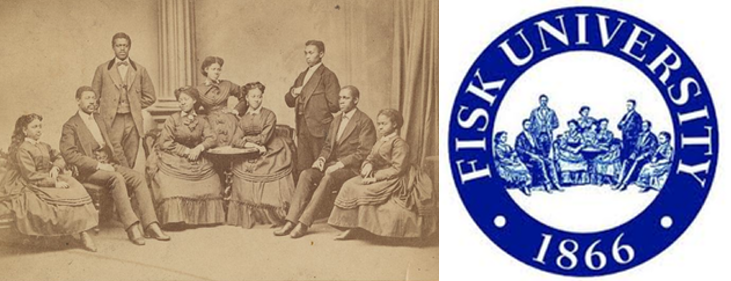
 George L. White was originally hired to serve as Fisk’s treasurer, but also found his way into the music classroom. Noticing the institution’s need for income, the treasurer turned music professor also became the school’s first director of choirs. In 1871, White established a choir of freed slaves that he later named the Jubilee Singers. The choir’s purpose was to go and tour the country to raise money for the university. Ella Shepard, the ensemble’s pianist, described the intentions and drive of White was “to sing the money out of the hearts and pockets of the people,” and with that, on October 6, 1871, the choir left Nashville on their first benefit concert tour of the Midwest.
George L. White was originally hired to serve as Fisk’s treasurer, but also found his way into the music classroom. Noticing the institution’s need for income, the treasurer turned music professor also became the school’s first director of choirs. In 1871, White established a choir of freed slaves that he later named the Jubilee Singers. The choir’s purpose was to go and tour the country to raise money for the university. Ella Shepard, the ensemble’s pianist, described the intentions and drive of White was “to sing the money out of the hearts and pockets of the people,” and with that, on October 6, 1871, the choir left Nashville on their first benefit concert tour of the Midwest.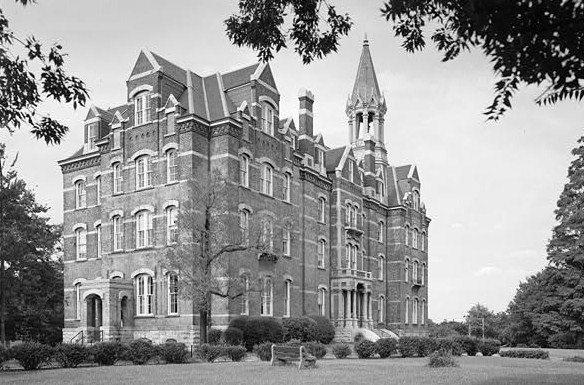 able to return to Nashville with $20,000 to be put into the institution. With the profit of their first tour, Fisk University was able to build it’s first permanent campus building, which was named Jubilee Hall and still serves the university to this day. So what exactly did the Jubilee Singers do to make their tour so successful? Simply put, they sang what they knew and what the people wanted to hear.
able to return to Nashville with $20,000 to be put into the institution. With the profit of their first tour, Fisk University was able to build it’s first permanent campus building, which was named Jubilee Hall and still serves the university to this day. So what exactly did the Jubilee Singers do to make their tour so successful? Simply put, they sang what they knew and what the people wanted to hear.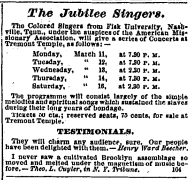 are capable of singing ‘popular music’,” that had nothing to do with their success. What consistently worked for the ensemble was to defer to their “native, religious songs.” Described in one concert advertisement as the “simple melodies and spiritual songs which sustained the slaves during their long years of bondage,” the music of the Jubilee Singers captivated audiences with their novel sound and religious messages. When asked about their music by members of the public, the singers would respond that “it was never written down” and that is passed down “from generation to generation” within their families. This repertoire, coined “slave songs” would not only carry the ensemble through a successful tour, but also skyrocket them to the national and international stage.
are capable of singing ‘popular music’,” that had nothing to do with their success. What consistently worked for the ensemble was to defer to their “native, religious songs.” Described in one concert advertisement as the “simple melodies and spiritual songs which sustained the slaves during their long years of bondage,” the music of the Jubilee Singers captivated audiences with their novel sound and religious messages. When asked about their music by members of the public, the singers would respond that “it was never written down” and that is passed down “from generation to generation” within their families. This repertoire, coined “slave songs” would not only carry the ensemble through a successful tour, but also skyrocket them to the national and international stage.
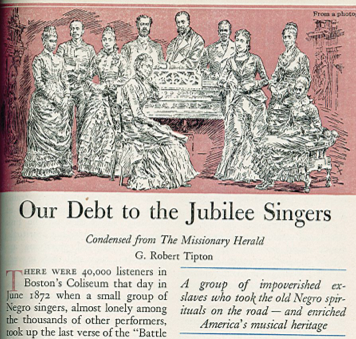 Regardless of your viewpoint on the ethics of choral repertoire when it comes to “selling” sound, the Fisk University Jubilee Singers have surely made their mark on our country’s history. More than 75 years after the Jubilee Singers inaugural tour, G. Robert Tipton wrote an article for The Missionary Herald in 1947, which was later re-published in Reader’s Digest in 1949, titled “Our Debt to the Jubilee Singers.” The article goes through a brief history of the ensemble from their establishment through their first European tour, but what I found most interesting was the summary sentence provided on the front page of the article. Tipton writes that the Jubilee Singers are “a group of impoverished ex-slaves who took the old Negro spirituals on the road – and enriched America’s musical heritage.” There is no doubt that the work of the Fisk University Jubilee Singers has not only enriched our nation’s musical antiquity, but quite possibly assisted in the preservation of the “slave song” genre that is so deeply rooted in America’s history.
Regardless of your viewpoint on the ethics of choral repertoire when it comes to “selling” sound, the Fisk University Jubilee Singers have surely made their mark on our country’s history. More than 75 years after the Jubilee Singers inaugural tour, G. Robert Tipton wrote an article for The Missionary Herald in 1947, which was later re-published in Reader’s Digest in 1949, titled “Our Debt to the Jubilee Singers.” The article goes through a brief history of the ensemble from their establishment through their first European tour, but what I found most interesting was the summary sentence provided on the front page of the article. Tipton writes that the Jubilee Singers are “a group of impoverished ex-slaves who took the old Negro spirituals on the road – and enriched America’s musical heritage.” There is no doubt that the work of the Fisk University Jubilee Singers has not only enriched our nation’s musical antiquity, but quite possibly assisted in the preservation of the “slave song” genre that is so deeply rooted in America’s history.